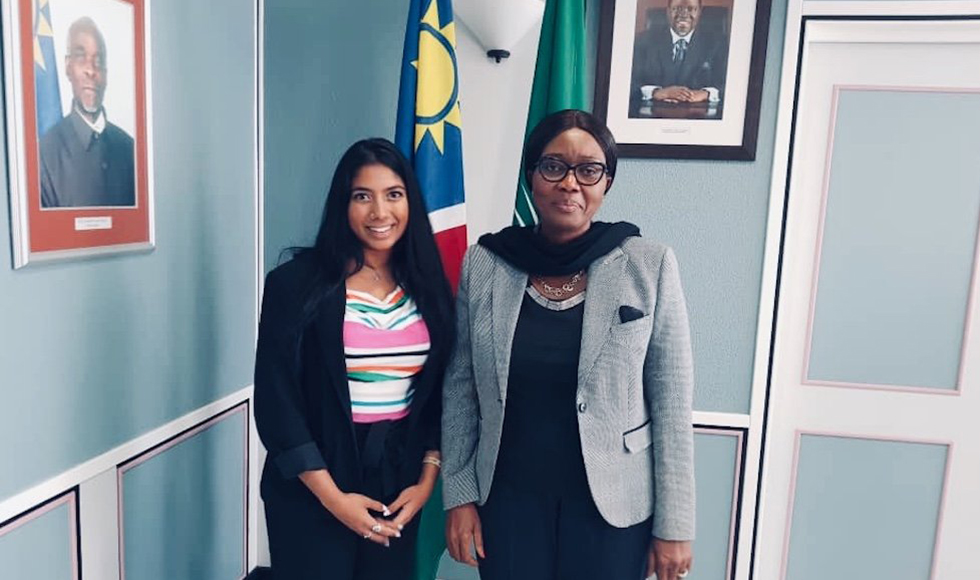Tackling gender-based violence and legislative reform in Namibia

MSc Global Health graduate Bianca Braganza with Namibian Prime Minister Saara Kuugongelwa.
BY Ruth Adair
September 5, 2019
When Bianca Braganza started the Master of Science in Global Health program in 2016, she couldn’t have imagined where the experience would take her. Today, the program graduate is in Windhoek, Namibia, working as an intern for the Law Reform and Development Commission at the Ministry of Justice of Namibia, where she’s directly involved in reforming legislation pertaining to mental health, disability rights, LGBTQIA+ rights and equitable economic empowerment based on race, gender and disability. And her article on gender-based (GBV) violence in India and Namibia was recently published in The Namibian, the country’s national newspaper.
“I’m immersed in projects that fuse my passion for global health with social justice, human rights, advocacy and activism,” says Braganza, who will enter her second year of law school at McGill University in the fall. “Here in Namibia, I’m seeing firsthand the power, gender and racial imbalances that colonial histories and apartheid have caused and the ground-breaking work the Commission is putting forth to create impactful and lasting social justice.”
Her article, informed by her work in Namibia and her learnings in the Global Health program, identifies GBV as a “tool employed to enforce racial and gendered hierarchies and reclaim misplaced power and order.” To tackle it, she calls for an expansive analysis of the social, political, economic and colonial forces that produce toxic masculinity.
The solution, she says, starts with education and teaching children respect for girls, women, and all persons – from LGBTQIA+ to those with disabilities. “Decolonising Namibia from GBV is in part a legal endeavour, but also entails multiple holistic societal components,” explains Braganza. “It requires civic education and engagement, and educating the public about misunderstood or taboo human rights issues through the use of creative outlets, such as film, theatre, and visual arts.”
Prior to joining the Global Health program, Braganza completed a BSc in Health Sciences from Western University and had initially considered pursuing a career in teaching or social work, but has since shifted her focus to law. “The Global Health program was fundamental to pushing me to pursue a path in this field because I want to be involved in tackling the overarching structures and systemic issues that produce ill health,” she explains.
Experiential learning and a deep commitment to the UN’s Sustainable Development Goals are at the heart of the MSc Global Health program. The exchange opportunity in the winter term is designed to foster global citizenship by introducing students to new cultures and perspectives, while the mandatory field practicum component is specifically designed to equip students with first-hand experience working in global health.
Braganza participated in an exchange to Maastricht University, one of McMaster’s seven institutional partners in the higher education consortium. The experience, she says, was transformative. “Until I went on exchange to the Netherlands, I’d spent most of my life in a ‘Toronto bubble,’” Braganza explains. “But then I found myself working with international minds, collaborating with people from different backgrounds and belief systems – and learning how to approach problems in a way that’s not ethnocentric.”
During her recent internship in Namibia, she’s had the opportunity to put theory into practice, drawing on concepts she learned in the program. Long term, Braganza sees herself continuing to pursue her passion for education, social justice, and law, and hopes to work in the field of international human rights law.
“I’m also looking at how I can bring what I’ve learned back to my own community in Toronto through civic participation in the legal landscape and increasing youth access to education and justice,” she says. “I hope to bring knowledge from this experience that tackles systemic and institutionalized racial and gendered inequities that exist here in Canada.”


